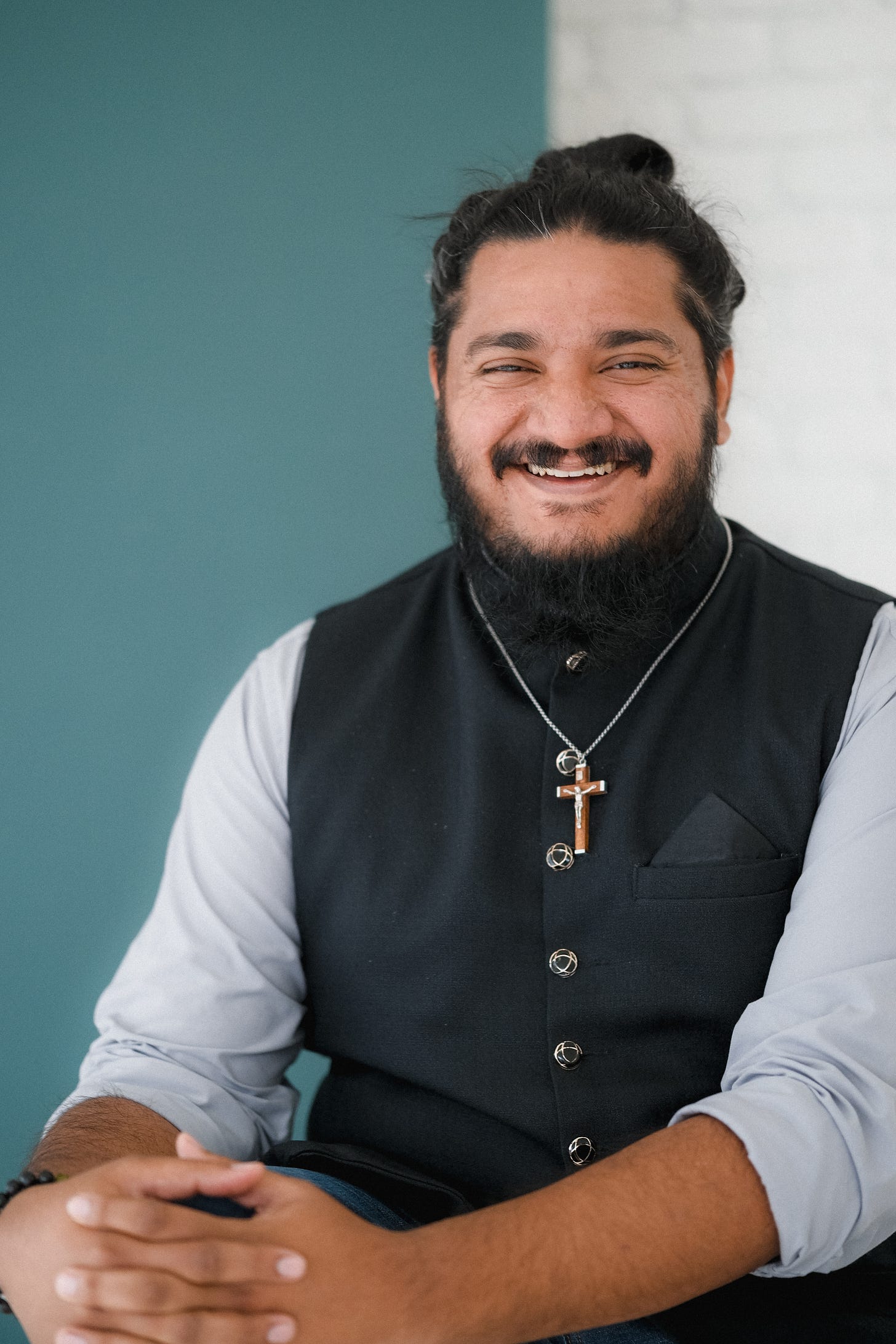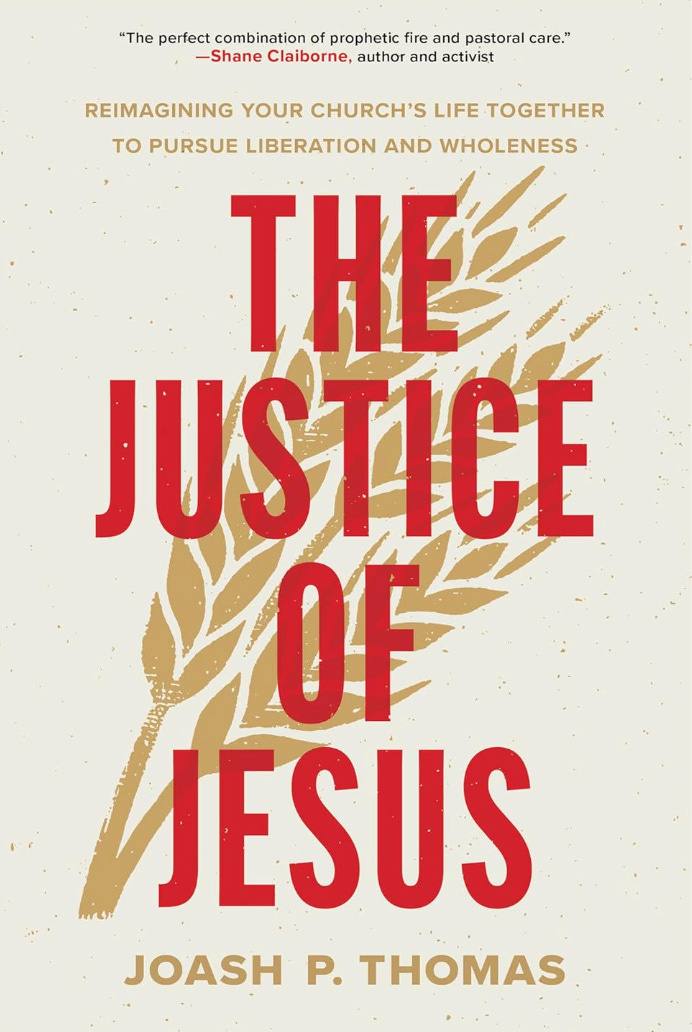Five Questions with Joash P. Thomas
A conversation about Colonialism, Western Christianity, and the Justice of Jesus
Public Theology is based on the work of Zach W. Lambert, Pastor of Restore, an inclusive church in Austin, Texas. He and his wife, Amy Lambert, contribute to and moderate this account. Zach’s first book, Better Ways to Read the Bible, is now available wherever books are sold.
All of the content available at Public Theology is for those who identify as Christian, as well as those who might be interested in learning about a more inclusive, kind, thoughtful Christianity. To receive new posts and support the work, consider becoming a free or paid subscriber.
We’re glad you’re here.
Here at Public Theology, we are all about centering the voices of others. There are things in our lives that we simply cannot speak to from personal experience, and in those cases, we need to seek the wisdom of those who can.
For example: Zach and Amy Lambert cannot comment on what it is like to live in a non-White, non-American body. We cannot speak to the hardships of being viewed as less-than because of the color of our skin. We do not understand the stress people like our friend
undergo because they come from colonized countries where Christianity has been weaponized against them and their families for decades, if not centuries.So, following the release of his book The Justice of Jesus: Reimagining Your Church’s Life Together to Pursue Liberation and Wholeness, we have asked Joash to tell us more about his experience. We are sitting under his expertise and trying to learn from his experience.
is not only a trusted source, he is a good person and friend, and we trust his voice. We hope you glean some knowledge from his responses below.Five Questions with Joash Thomas
A conversation about Colonialism, Western Christianity, and the Justice of Jesus
Q: You have said, “Colonialism wasn’t just bad for the Global South, it was also bad for the Western church.” What do you mean? And why does it matter for Western Christians today?
A: Yes! This is in fact a core thesis in my book. I say this because I strongly believe that colonialism has shaped the Western Church to resist justice for our marginalized neighbors inside and outside the Church. Injustice isn’t just bad for the oppressed; it’s also bad for the oppressors and those on their side. The Western Church (including the Roman Catholic Church, the Church of England, the Dutch Reformed Church, the Southern Baptist Convention, and Southern Presbyterians) all actively participated in colonialism and were shaped by their participation in it to resist justice. So, instead of seeing the gospel of Jesus as “good news for the poor, liberation for the captives, recovery of sight for the blind, and freedom for the oppressed” (as defined by Jesus in Luke 4:18), colonialism conditioned Western Christians to see the gospel as purely a “get out of hell free card”. This is because it was financially advantageous for colonizer and slaveholder Christians to tell colonized and enslaved Christians, “Don’t worry about your physical suffering because Jesus cares way more about the salvation of your soul than the freedom and well-being of your human body.” As you write in your book, Zach - “God hates sin because sin hurts his children.” Similarly, colonialism hurt all of God’s children - both the oppressed and the oppressors.
Q: When did your interest in colonialism and justice begin, and how it has grown over the years?
A: When I was a 15-year-old teenager growing up in Mumbai, a wave of persecution hit the Church on the eastern coast in India. As someone who grew up very privileged on the western coast of India, this wave of persecution jarred me. For the first time, I started to theologically wrestle with questions of justice and injustice. That’s when the Holy Spirit convicted me. I felt the nudge of the Spirit telling me, “You only care about injustice now that it affects your community. But what about the millions who suffer in silence because their voices are suppressed by those in power? Does your Jesus not care about them too?” That then got me started on a journey of trying to find Jesus on the margins. To me, colonialism is not an academic theory; it’s my family’s lived experience. My family has somehow survived the effects of colonization. Growing up in India, you are constantly confronted with stories of the wealth of your homeland that was pillaged for centuries by western colonial powers; and how the Western Church participated in the oppression of my people. Coming to America at 18 as an immigrant, I realized that the vast majority of American Christians were clueless about colonization and how they (and now myself) are beneficiaries of the same - including by living on land stolen from our indigenous neighbors. At first, I didn’t think too much of it. But then, I started noticing how many Western Christians were conditioned to think of justice as “Marxist” instead of “Christian”. In working in international human rights, I would often run into US and Canadian evangelical pastors saying, “What’s the point of rescuing children from trafficking if their souls go to hell? Aren’t they dead in the water any way?” This got me started on a journey (while also studying at the same top conservative evangelical seminary as Zach) of wondering what would cause these North American evangelical pastors to say things that even their Global South evangelical counterparts would never say. I recently told a Dutch Pastor friend this: “I’m just a guy standing in front of the Western Church asking us to prioritize justice for all our marginalized neighbors. Somewhere along the way, I realized that one of the biggest barriers to prioritizing justice in the Western Church is our colonized theological frameworks. That’s when I decided to take on colonized Christianity.”
Q: Your book suggests practical ways to return to a justice-centered, precolonial faith. Can you share one example of how you are practically doing this?
A: I love this question! I recently signed an online petition with Oxfam to ask my Canadian government leaders to stop sending weapons to kill children in Gaza. A few days later, I got a call from Oxfam thanking me for raising my voice and asking if I’d consider doing more by becoming a monthly donor to support their ongoing relief and sustainable development work in Gaza and the West Bank. At first, I considered only giving a one-time gift. But then I remembered what I teach throughout my book - the justice of Jesus will almost always cost us something. So I decided to dig deep and give up a couple of mango lassis a month to chip in as a monthly donor in a very modest way. I have a whole chapter in my book on Advocacy, a whole chapter on Partnering financially, but also a whole chapter on decolonizing our individual and church / organizational budgets to prioritize the wholeness of our marginalized neighbors.
Q: Who are you learning from in this pursuit of decolonizing your faith traditions and practices?
A: Throughout the book, I draw on the ancient wisdom of my St. Thomas Indian Christian ancestors who have been worshiping Jesus for 2000 years now thanks to the apostle Thomas who brought the just and liberating gospel of Christ to my ancestors - 1500 years before the first wave of western colonizers showed up and tried to convert them to their western ways of worshiping Jesus. Two of the ancient, precolonial values that my ancestors embodied were ecumenism and pluralism. To this end, I’ve been trying to read more Catholic and Orthodox siblings in Christ; while also learning more about the Hindu, Muslim, and Sikh faiths from primary sources. All truth is God’s truth and if I truly believe that Christ has revealed himself across all societies and cultures, I must cultivate the eyes to see Jesus in these places like my ancestors did - especially on the margins. Some other folks I’m learning from right now would be Palestinian liberation theologians and Indigenous liberation theologians. They are teaching me so much and challenging me on my own settler colonial privilege in North America. After all, as I say in the book, I am both a child of colonization and a beneficiary of colonization. I became a beneficiary of colonization the day I moved to North America as an immigrant and started benefitting from stolen wealth and stolen land from our Indigenous neighbors.
Q: Where can people find you and support the work that you’re doing?
A: First off - I’d be so honored if people supported the work of this first time author by buying my book! I’m most active on Instagram these days at @JoashPThomas and Substack at Jesus, Justice & Joash. I send out a weekly, free Substack newsletter called ‘Justice in the Lectionary’ where I reflect on the lectionary Scripture readings each week and share the justice-related themes I’m seeing. I am also on Twitter, Threads, TikTok, and BlueSky with the same handle (@JoashPThomas). The work of justice can often feel lonely for Western Christians but it doesn’t have to be this way. I look forward to connecting with your community more in the days ahead!
We hope you are able to support Joash’s work in some way: buy his book, subscribe to Jesus, Justice & Joash, follow him on other socials, share this post, or reach out to him directly to let him know that his work has positively impacted you.
Thank you
for sharing with us!Lastly, we are happy to cover subscription costs for anyone who needs it but can’t afford it at this time. If you would like to join the Public Theology community and gain access to our paid subscriber content (which we keep behind a paywall for the privacy and connection of our community) but cannot afford to do so, please message Amy Lambert directly.








So enjoyed this conversation! Tremendously grateful for you both.
What a wonderful conversation. I just ordered ordered Joash's book and look forward to learning more!